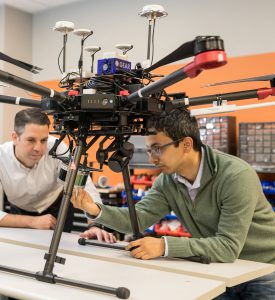
General Electric Company (GE) is considered to be one of the top global companies. According to Forbes, it ranked GE #12 out of 100 global companies. That’s right, globally. With concentrations of company resources, including research and innovation, throughout the world, it continues to play a major role locally in the Capital Region.
As part of our Alumni Series, we continue to highlight SCCSD graduates and the work they are contributing to their communities – near and far away. GE’s Executive Leader in Robotics and Autonomous Systems John Lizzi (Class of 1997) contributes to that role. A graduate of Siena College (B.S. Computer Science), University at Albany (M.B.A. Management) and Rensselaer Polytechnic Institute (M.S. Computer and Systems Engineering) he’s an innovator working to enable GE to be a worldwide leader in robotics and AI.
See how he’s using a background in mathematics and computer science to keep GE at the top of their game.
How did you select your pathway to GE? Any advice for today’s students?

With my schooling primarily focused in tech, I was looking for a company that tackled big technology challenges but also focused in areas that had major societal impact. When I had a chance to interview for an internship at GE Research my junior year at Siena, I was exposed to cutting edge research the teams were doing in healthcare, energy, and aviation, and I was hooked. The internship gave me (and the company) a chance to “try before you buy” and luckily it worked out well. I highly recommend students get exposed to potential careers and companies as early as possible – internships, job shadowing, or just simple phone conversations can be extremely helpful in guiding you on your way.
What classes at South Colonie gave you a perspective on a future career?
It was definitely mathematics for me. Mr. Outman’s calculus class was one of the key classes that pointed me toward engineering and eventually to computer science.
What are your day-to-day responsibilities at GE?
There are several facets of my day-to-day. First and foremost, it’s making sure the brilliant engineers and scientists that are part of my team have what they need to be successful. Our team invents and builds next generation systems for a wide range of industrial and defense applications leveraging technology like robotics and AI and ensuring we’re in a position to deliver to our customers is critical. I also play a horizontal role across the company focused in setting and driving the vision and strategy in robotics and autonomy. Lastly, I spend a lot of time with customers both within GE and externally with the U.S. government and commercial clients. I also sit on several boards and advisory committees outside of the company to guide the broader industry and to learn.
How do you envision robotics to impact tomorrow’s workplace?
The terms robotics, automation, AI, and autonomous systems can conjure up some negative images but they’re already having an impact on our daily lives, in many cases in ways that we don’t see or even know about. In fact, if you’ve ordered something online recently, for example from Amazon, you’ve triggered a process that will use all of these technologies. I believe the use of these technologies will only grow and will eventually blend more and more into our daily lives at home and in the workplace. In the context of work, we see robotic systems becoming teammates that will work with us to help us address what we refer to as the 3 D’s of robotics – dull, dirty, or dangerous work.
What advice would you give to a freshman at CCHS?
I’d suggest a few things:
- Follow your heart, not the crowd or the money. If you follow your heart, and put everything you have into whatever you pursue, the crowd and the money will follow you.
- Work ethic matters. I grew up in a family where work ethic was valued, and the examples in my family have stuck with me throughout my career. I like to think

Class of 1997 graduate John Lizzi and his family enjoying time together.
I’m smart but I believe my work ethic is a major reason I’m where I am. - If you’re not occasionally struggling, you’re not growing. Take the harder courses in school, do the extra work, jump into the harder assignments in your jobs, take risks, especially early in your career. It’s during these tough times and struggles that you learn the most and grow and that will pay off.
- Keep your life balanced. Despite everything I said above, don’t forget about your roots, your health, and the things that are most important to you; ensure you’re allocating your time appropriately. I’ve seen many colleagues who have been professionally successful but have done so at the expense of health, family, and friends and it rarely ends up well.
